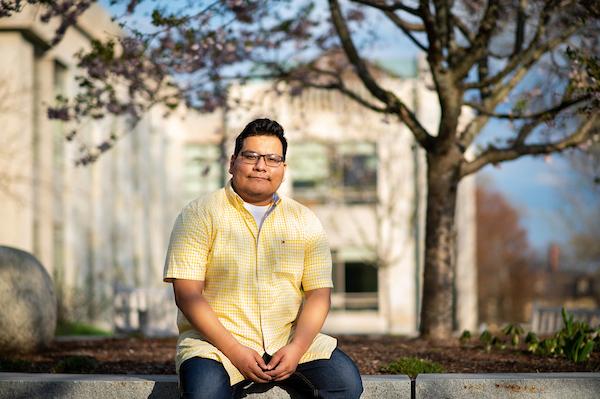Senior Spotlight: Effecting Change Through a Public Health Lens

By Meredith Berg
A clear and compelling desire to help others propels Alejandro Baez, A21, toward an interest in community health.
Whether he helped create conversations at Tufts to assist first-generation college students with communication challenges or organized ways to destigmatize mental health through art showcases, Baez used his time and the resources at Tufts to get closer to that goal.
Through his studies, Baez also began to understand why many of the situations he faced as a child of Mexican immigrants were challenging. His coursework exposed him to issues like inequities in healthcare, education, and housing rights, which in turn helped him to contextualize his own experience growing up in Las Vegas.
He was inspired to make a difference on these issues and took on numerous related internships and research opportunities at organizations like Fenway Health, Massachusetts General Hospital, and Harvard T.H. Chan School of Public Health.
“One of my guiding principles is that I want to help other people. It was important to me to really hone in on that,” said Baez.
Tisch College of Civic Life became the place within the university where he could follow that passion. “Tisch offered a lot of opportunity to get involved in the community. My interests aligned closely with what Tisch is all about,” he said.
In his second year at Tufts, Baez was chosen to be a Tisch Scholar, a leadership development program that combines academic coursework and fieldwork in local communities. Through the program, he worked at Cambridge Health Alliance and had the opportunity to organize and collaborate with artist Linda Michaud Cutrell to help de-stigmatize mental health in 2019. The resulting art and film series, called Stigma Unstuck: A Mental Health Arts Series at Tufts, sought to enhance awareness and understanding of mental health issues.
Among the many components of the event was an eight-hour mental health training, which Baez helped organize, that included information on how to respond in the case of a mental health emergency.
In another instance, Baez and a friend wanted to bring awareness to issues experienced by first-generation college students, such as language barriers that can be particularly evident during classes. With the help of Jonathan Garlick, a Tufts University School of Dental Medicine faculty member who teaches across disciplines at Tufts, Baez facilitated a dialogue with a number of professors in the School of Arts and Sciences, which resulted in revising language on departmental syllabi.
“We followed up with the Tufts Department of Community Health and helped them amend their language on syllabi,” Baez said, “to reinforce the message that if English is your second language, it’s OK to ask for help.”
In his third year, Baez confirmed his interest in studying psychology, after spending a night awake helping someone through a mental health emergency.
“I was left alone and powerless when the text messages ended. That’s when I realized I don't like that feeling. I wanted to understand why these mental health issues happened,” he said. “There are a number of ways to tackle these health issues, and changing policy and systems that affect people in entire communities is an effective way to combat these problems.” He ultimately became a double major in community health and psychology.
After all his experiences, Baez said he feels “indebted” to the Department of Community Health for teaching him how to be a public health professional. “When you walk into that department, you get the sense that everyone in there cares; it’s this passion that sets Community Health apart. They’re actively working to make the world a better place,” Baez said.
Baez also credits his friends for supporting him through his time at Tufts. He cited a core group of four friends as a second family instrumental to his success at Tufts and who, he said, helped pull him through periods of burnout.
Baez has his sights set on graduate school in a couple years. For now, he looks forward to professional opportunities with an eye toward data analysis in the community health space.